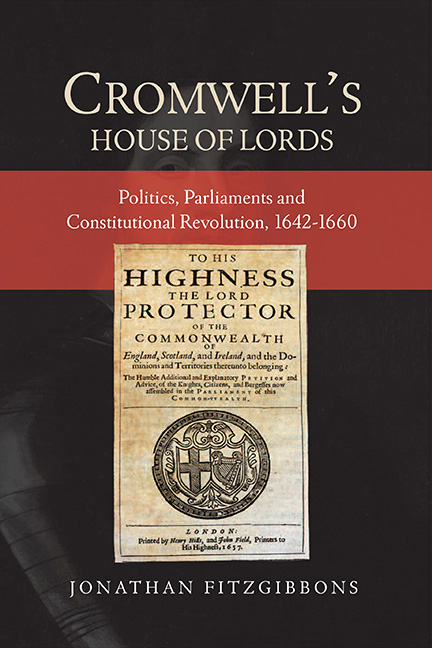Book contents
- Frontmatter
- Contents
- Acknowledgements
- Abbreviations
- Introduction
- 1 Parliamentarian Thought and the Abolition of the House of Lords, 1642–49
- 2 Oliver Cromwell, the Other House and the Humble Petition and Advice
- 3 The Membership of the Other House
- 4 The Other House and the Second Session of the Second Protectorate Parliament
- 5 Richard Cromwell, the Third Protectorate Parliament and the Other House Debates
- 6 The Other House, the Army and the Search for a Settlement
- Conclusion
- Appendix: The Membership of the Other House
- Bibliography
- Index
- Studies in Early Modern Cultural, Political and Social History
1 - Parliamentarian Thought and the Abolition of the House of Lords, 1642–49
Published online by Cambridge University Press: 05 May 2018
- Frontmatter
- Contents
- Acknowledgements
- Abbreviations
- Introduction
- 1 Parliamentarian Thought and the Abolition of the House of Lords, 1642–49
- 2 Oliver Cromwell, the Other House and the Humble Petition and Advice
- 3 The Membership of the Other House
- 4 The Other House and the Second Session of the Second Protectorate Parliament
- 5 Richard Cromwell, the Third Protectorate Parliament and the Other House Debates
- 6 The Other House, the Army and the Search for a Settlement
- Conclusion
- Appendix: The Membership of the Other House
- Bibliography
- Index
- Studies in Early Modern Cultural, Political and Social History
Summary
Thomas Hobbes, reflecting on the history of the 1640s and 1650s, found it a ‘strange thing the whole house of Lords should not perceive that the ruine of the Kings Power, and the weakning of it, was the ruin or weakning of themselves’. By fighting the king, the Lords condemned themselves to oblivion; they could hardly ‘think it likely, that the people ever meant to take Soveraignty from the King, to give it them’. In reality, there was no reason for those peers who sided with parliament in 1642 to foresee the destruction of their chamber. Although the Act abolishing the House of Lords, passed by the Rump of the House of Commons on 19 March 1649, claimed that they had ‘too long experience’ of the inconveniencies that the Lords posed, it was really the experience of the 1640s, and particularly the events of the winter of 1648–49, that led them to this conclusion.
From the outbreak of the war, parliamentarian arguments advanced to make plain the king's contractual and subordinate position vis-à-vis parliament, rendered the position of the House of Lords increasingly anomalous. The story of parliamentarian political thought can be told as one of unintended consequences. By justifying the war effort, parliamentarian writers with no interest in subverting England's ancient constitution of king, Lords and Commons, promoted ideas that were ultimately invoked by a minority of parliament's supporters to dismantle that framework.
Parliamentarian thought developed only tentatively during the early 1640s, responding to constitutional questions as they arose, or as opponents posed them. Ideas were not the stimulus for actions, but were found to justify them. Once articulated, defended and clarified, however, those ideas became systematized and concretized into a holistic parliamentarian position that was difficult for its adherents to forget or refute. Most obviously, the idea of parliamentary supremacy became integral to those defending the taking of arms against the king, meaning it could hardly be reneged on at a later stage – to do so would undermine the parliamentarian cause itself. Moreover, ideas, once invoked to justify actions, acted as a guide – or limit – to the range of acceptable future actions open to the parliamentarians.
- Type
- Chapter
- Information
- Cromwell's House of LordsPolitics, Parliaments and Constitutional Revolution, 1642–1660, pp. 8 - 35Publisher: Boydell & BrewerPrint publication year: 2018

